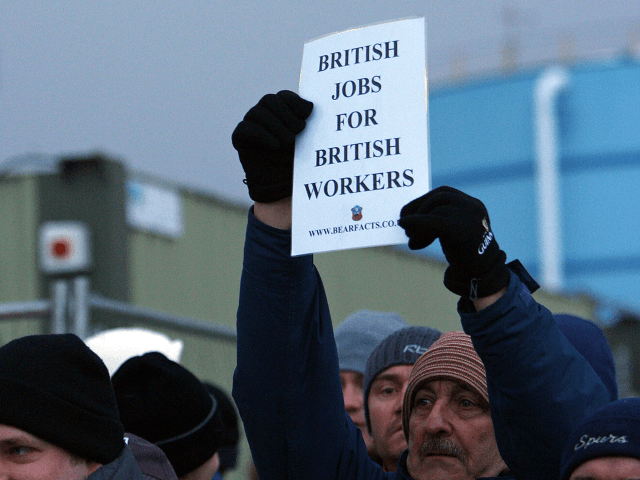Ronny Gottschlich, who ran the discount supermarket giant Lidl in the United Kingdom for six years, has admitted that bosses have used European Union migrants to hold down wages.
Free Movement of People, originally conceived as Free Movement of Labour, is one of the so-called “Four Freedoms” of the European Union, allowing migrants to travel throughout the bloc effectively unvetted and in unlimited numbers.
The regime has seen millions of usually low-skilled migrants travel from low-wage, low-benefits countries in Central Europe and, increasingly, Southern Europe, to the United Kingdom — a process most eurosceptics argue has degraded pay and conditions in working-class occupations such as hospitality and retail, as well as increasing the cost of rent and house prices and putting pressure on the transport network and public services.
Now, in an interview with BBC Radio 5 Live, the long-time head of German discount supermarket chain Lidl in the United Kingdom, Ronnie Gottschlich, had admitted that if “your cheap labour falls away, you [will] get quite a bit of pressure in the market… and this will ultimately lead to higher wages.”
Brexit Boom: Wages Up, Skilled Jobs Expanding, Says Top Recruiter https://t.co/D93dKmIclR
— Breitbart London (@BreitbartLondon) January 13, 2019
Gottschlich appeared to indicate that higher wages in the grocery retail sector would be a bad thing, however, claiming it would lead to “food inflation” and arguing that “if you take a look down to London, it just wouldn’t have been possible to recruit the number of people [employers] needed” without access to the massive pool of cheap foreign labour which Free Movement provides.
“There’s no doubt, if you wouldn’t have had the labour available from other parts of the European Union, this would have ultimately had to lead to a higher wage, because you needed to attract employees, let’s say, from Britain, to work in your stores,” he confessed.
The German businessman received some pushback on the supposed downsides of better pay from presenter Louise Cooper, who observed: “Don’t underestimate how quite how damaging low wages have been.”
“If you go back to the 2000s, up to about… 2008, wages were growing at 4 to 6 percent, and inflation was about 2 [percent]. Since the crisis, wages have grown sort of 0 to 2 [percent],” she explained.
“[They have] slightly ticked up, actually, in the last three months — first time since the crisis hit that we’ve had three months of wages going up more than 3 percent… I think many people in this country — of course, as a business, [you] complain about wages going up because it’s a cost — but for many people in this country, they wouldn’t see it like that. They think wages going up would be a great thing, and probably would be a good thing in terms of consumer confidence and consumer spending.”
The EU allows bosses to employ migrant workers on low wages, rather than invest in young people. #EUref pic.twitter.com/oUXMgdc0km
— Leave.EU (@LeaveEUOfficial) June 21, 2016
The increase in British wages has indeed coincided with a significant fall in the number of EU migrants entering Britain since the Brexit vote — and with a concomitant increase in complaints from big employers and their lobbyists that access to cheap foreign labour must be increased.
The BBC programme also noted that the British economy is continuing to grow, albeit modestly, while countries firmly embedded in the European Union such as Germany and Italy are either in recession or not growing at all.
UK Central Bank Report CONFIRMS Immigration Leads To Lower Wages https://t.co/JH5FZhZeFA via BreitbartNews #LeaveEU
— Leave.EU (@LeaveEUOfficial) December 22, 2015

COMMENTS
Please let us know if you're having issues with commenting.